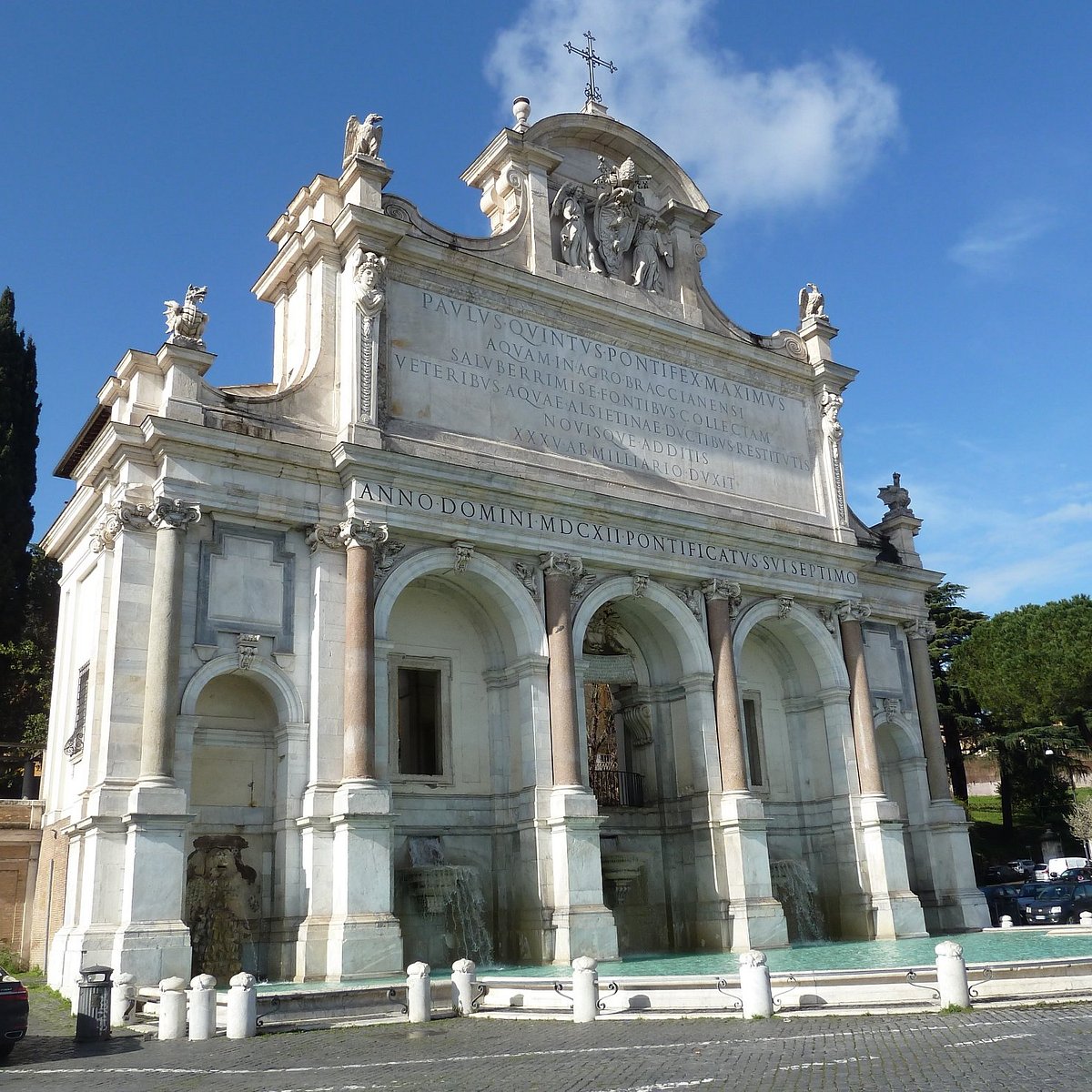
FONTANA DELL'ACQUA PAOLA (Rome) Ce qu'il faut savoir
La Fontana dell'Acqua Paola, más conocida como Il Fontanone, es una de las fuentes de Roma más destacadas. Situada en la el Gianicolo, Il Fontanone se ha convertido meritoriamente en uno de los símbolos de la célebre colina.

Fontana dell'Acqua Paola The Fontanone
The Aqua Traiana (later rebuilt and named the Acqua Paola) was a 1st-century Roman aqueduct built by Emperor Trajan and inaugurated in 109 AD. [1] It channelled water from sources around Lake Bracciano, 40 km (25 mi) north-west of Rome, to ancient Rome. It joined the earlier Aqua Alsietina to share a common lower route into Rome.
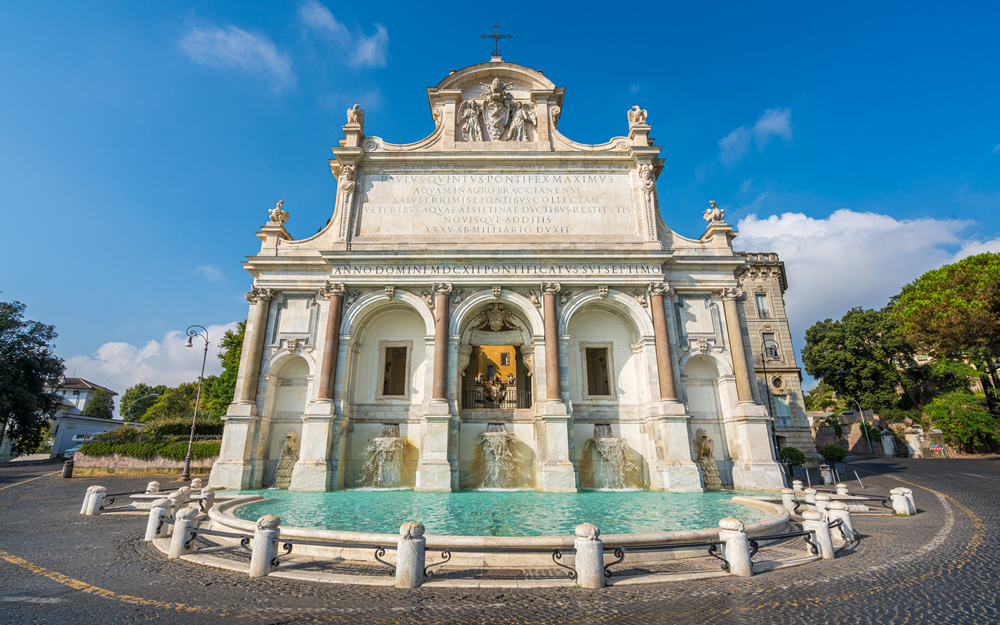
Fontana della Barcaccia descrizione e curiosità
January 25, 2016. Emma Schmidt, Associate. One of Rome's most beautiful (and least crowded!) fountains, the Fontana dell'Acqua Paola, sits atop the Gianicolo, a hill west of the historic center of Rome. The fountain's name, literally "The Fountain of the Paulian Water" speaks of its creator: Pope Paul V. The fountain is simple, yet.

` Acqua Paola Del Dell De Fontana En Roma Imagen de archivo Imagen de
The Fontana dell'Acqua Paola also known as Il Fontanone or Mostra dell'Acqua Paola is a monumental fountain located on the Janiculum Hill, near the church of San Pietro in Montorio, in Rome, Italy. It was built in 1612 to mark the end of the Acqua Paola aqueduct, restored by Pope Paul V, and took its name from him. It was the first major fountain on the right bank of the River Tiber.

Acqua Paola Fountain in Rome Image stock éditorial Image du vieux
'The Fontana dell'Acqua Paola.', 1751. Giovanni Battista Piranesi (1720 - 1778) RA Collection: Art Title 'The Fontana dell'Acqua Paola.' Artist/designer. Giovanni Battista Piranesi (1720 - 1778) Engraved by. Giovanni Battista Piranesi (1720 - 1778) Published by. Giovanni.

La fontana dell'Acqua Paola Un Sardo in giro
Fountain of Apollo, Madrid. From Wikimedia Commons, the free media repository. English: The Fountain of Apollo or Fountain of the Four Seasons is at Paseo del Prado (boulevard) in Madrid ( Spain ). It was designed by Ventura Rodríguez and sculpted between 1780 and 1803 by Manuel Álvarez and Alfonso Bergaz. Español: La Fuente de Apolo o.

The Fontana dell' Acqua Paola, Rome Walks in Rome (Est. 2001)
The Fountain of Acqua Paola (Fontana dell'Acqua Paola) is one of the most romantic and breathtaking places in Rome. It is known by Romans as "er Fontanone" (the "Big Fountain") and is a baroque masterpiece which stands on Janiculum (Gianicolo) hill near the 180 degree view of Rome.
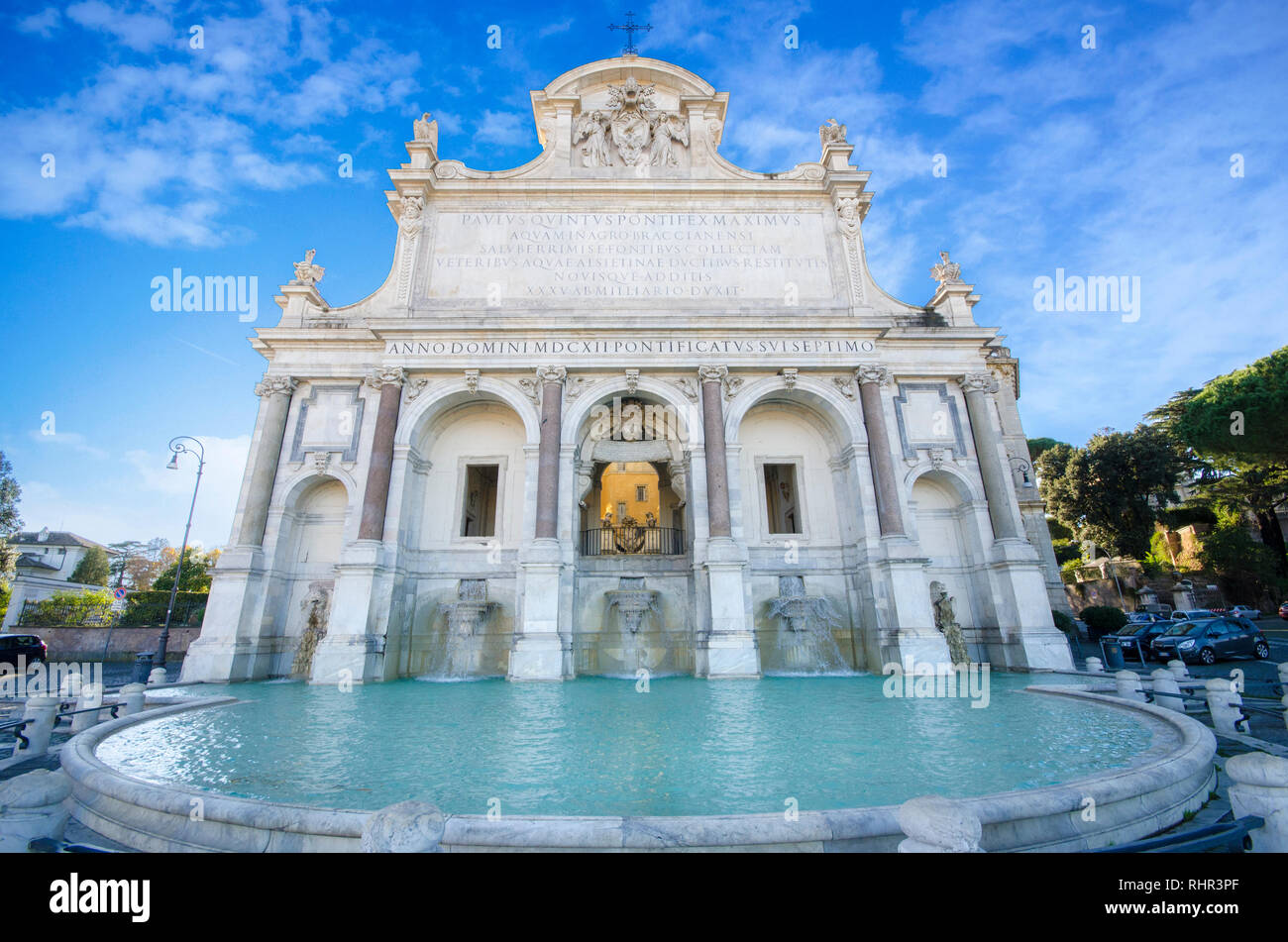
Fontana dell'Acqua Paola auch als Il Fontanone ("Der große Brunnen
With its breathtaking view, the Fontana dell'Acqua Paola is one of the most romantic and picturesque places in Rome. Known by Romans as " er Fontanone " (the "Big Fountain"), it is a baroque jewel that graces the Janiculum landscape with its marble splendour.
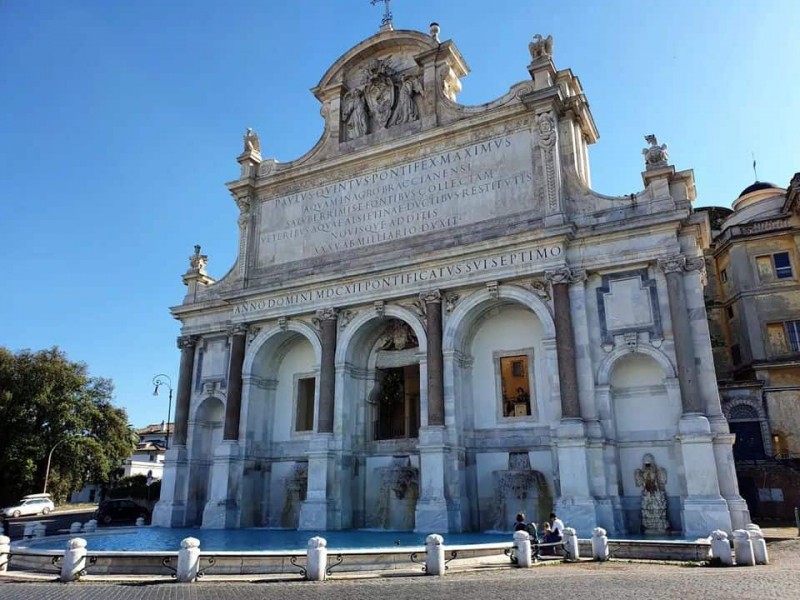
Fontana dell'Acqua Paola Treasures of Rome
The Fontana dell'Acqua Paola also known as Il Fontanone ("The big fountain") or Mostra dell'Acqua Paola is a monumental fountain located on the Janiculum Hill, near the church of San Pietro in Montorio, in Rome, Italy. It was built in 1612 to mark the end of the Acqua Paola aqueduct, restored by Pope Paul V, and took its name from him.

Fonte De Acqua Paola Em Roma (Italy) Imagem de Stock Imagem de parede
Fontana dell'Acqua Paola. Featured in the opening scene of Paolo Sorrentino's Oscar-winning La grande bellezza (The Great Beauty; 2013), this monumental white fountain with its thundering water was built in 1612 to celebrate the restoration of a 2nd-century aqueduct that supplied (and still supplies) water from Lago di Bracciano, 35km north.

Dell Acqua Paola Acqua Paola Fountain De Fontana, Gianicolo, Roma
The Fontana dell'Acqua Paola, also known as the Fontanone, or Fontana del Gianicolo, is a monumental fountain built in 1600 and located in the Trastevere district.. This beautiful fountain has become famous to the Italian public for the citations of it in film and music and to the world public for being mentioned by the German writer and poet Johann Wolfgang von Goethe in his essay Journey.

CONTENT] Fonte Acqua Paola is a fountain built to embellish a Roman
The Fontana dell'Acqua Paola was built between 1610 and 1612. The monumental facade, decorated with angels, monsters and dragons, is characterized by five arches and six granite colonnades, four of which come from the ancient facade of St. Peter's Basilica. The impressive basin is attributed to the architect Carlo Fontana.

Fontanone del Gianicolo (Mostra dell'Acqua Paola) Turismo Roma
Fontana dell'Acqua Paola 9 reviews #890 of 2,410 things to do in Rome Fountains Write a review About Duration: < 1 hour Suggest edits to improve what we show. Improve this listing Tours & experiences Explore different ways to experience this place. See options All photos (17) Top ways to experience Fontana dell'Acqua Paola and nearby attractions

Acqua Paola Fountain in Rome Stock Image Image of bright, paola
The Fontana dell'Acqua Paola, also known as the "Fontanone" ("Big Fountain") of the Janiculum, was commissioned by Pope Paul V Borghese (1605-1621) following the restoration of the Acqua Traiana aqueduct, which he had promoted in 1608. The construction of the fountain, built between 1610 and 1614 as the terminal mostra of the Traiano.
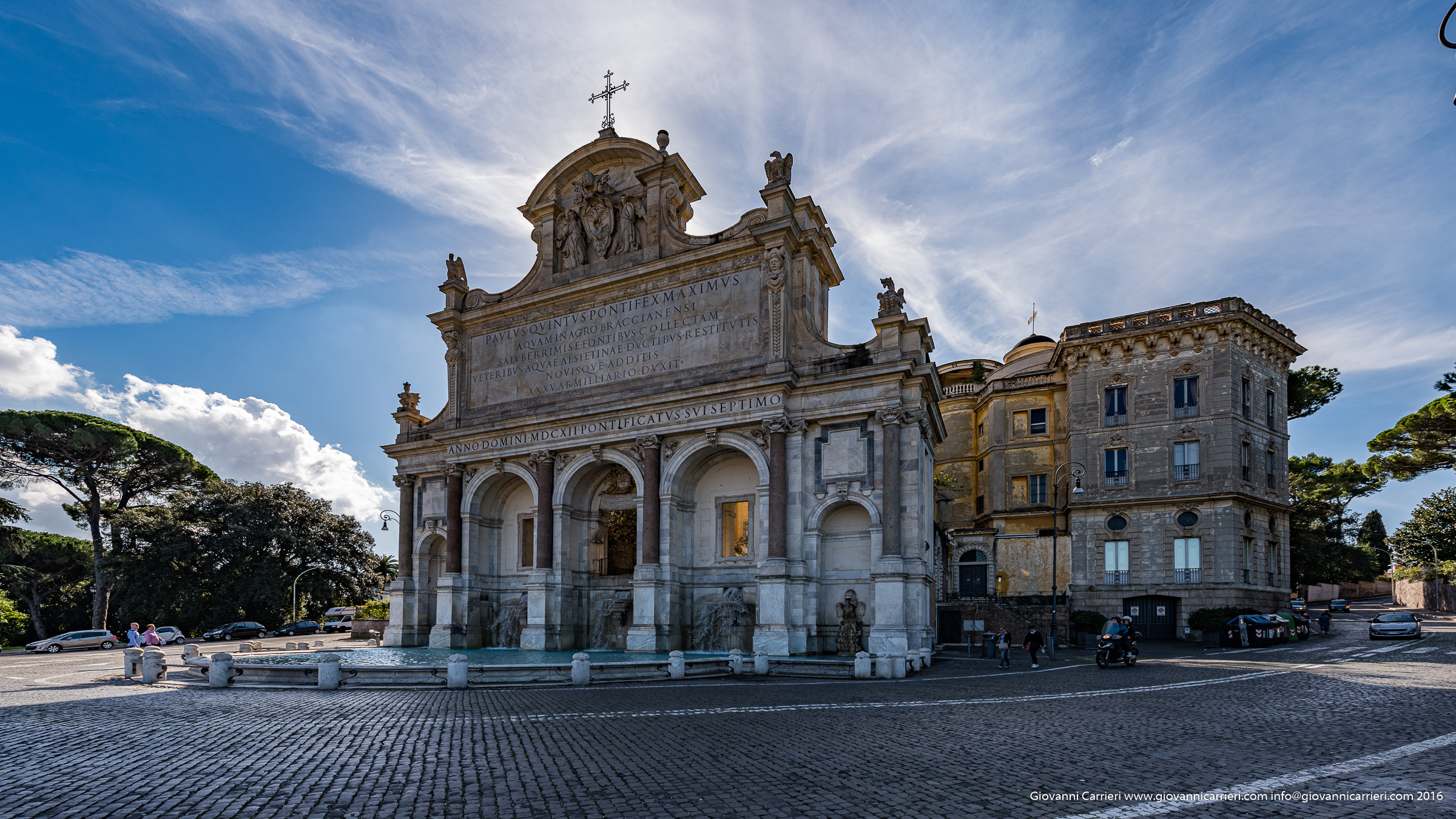
La fontana dell'acqua Paola
The Fontana dell' Acqua Paola, which was the first major fountain to be erected on the left bank of the Tiber, was fed by the Aqua Trajana, an ancient aqueduct built by the emperor Trajan (r. 98-117). The aqueduct was restored by Pope Paul V and renamed the Acqua Paola.

Fontana Dell Acqua Paola Monumental Fountain Em Roma Itália Fotografia
Aqua Traiana. The Aqua Traiana (later rebuilt and named the Acqua Paola) was a 1st-century Roman aqueduct built by Emperor Trajan and inaugurated on 24 June 109 AD. [1] It channelled water from sources around Lake Bracciano, 40 kilometers (25 mi) north-west of Rome, to Rome in ancient Roman times but had fallen into disuse by the 17th century.